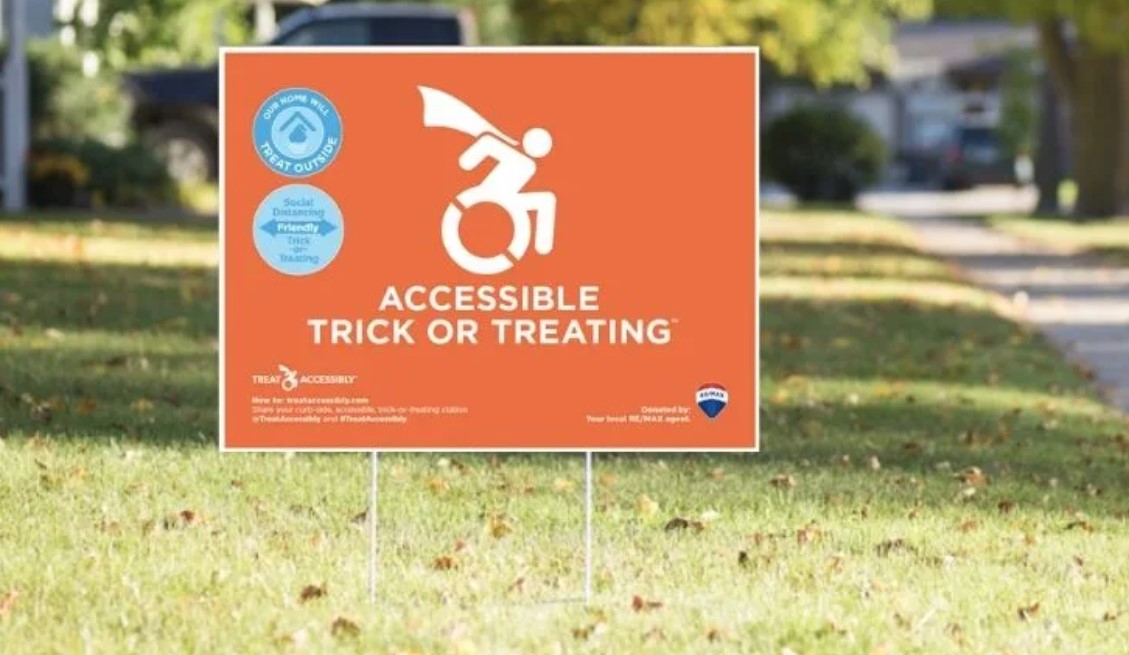Treat Accessibly joins forces with RE/MAX and Home Depot Canada for third year, to encourage Canadians to adopt accessible and safe trick-or-treating practices
- Recent survey says close to 80 per cent of parents with kids ages three to nine years are seeking a safer trick-or-treating option this Halloween
- In a COVID-19 recovery-focused Canada, the accessible trick-or-treating movement helps all families look forward to a safer Halloween
Trick-or-treating is a Halloween tradition that most children look forward to, but even reaching the front door of a neighbour’s home can be a challenge for kids with accessibility issues. The Treat Accessibly movement aims to make a small change by encouraging communities to celebrate Halloween in an accessible way that’s inclusive of more than 400,000 Canadian children and youth who live with accessibility issues.
Now in its third year, the Treat Accessibly campaign is even more relevant in 2020, in the midst of COVID-19. Halloween is bound to be different this year, but provided that local governments and public health agencies advise it is safe to do so, Treat Accessibly’s goal is to make trick-or-treating safer, socially distanced and accessible to all.
The Treat Accessibly movement began in 2017 at one home in Etobicoke, Ontario, with a single lawn sign designed by small business owner and father Rich Padulo, who set a precedent to promote accessibility awareness and adoption as a standard practice. The bright orange sign indicates the resident’s willingness to hand out Halloween treats from an accessible area near their home, such as the foot of the driveway or the sidewalk. By 2019, with the help of RE/MAX and Home Depot, 25,000 homes across Canada were participating in the Treat Accessibly movement by posting their own orange lawn sign. Participants can also download and print their own sign.DOWNLOAD & PRINT YOUR OWN SIGN
.
Last year’s success coupled with this year’s new social distancing practices have given the Treat Accessibly movement an added boost, with champions from all sectors supporting the program, including Ontario Ministers, the Mayors of Toronto, Brampton, Oshawa, Hamilton and St. Catharines, as well as organizations representing the differently abled community, such as the Rick Hanson Foundation, Easter Seals, Variety Village and more.
- In 2017 – 1 house started it
- In 2018 – 2,500 homes across Ontario joined in
- In 2019 – 25,000 + homes across Canada participated
- In 2020 – Our goal is to have 50,000+ homes participating
“Our goal is to rally the 25,000 homes that participated last year and win others over to have 50,000+ homes participating and millions of families seeing the program in action. We will have free Treat Accessibly lawn signs available at participating RE/MAX offices and Home Depot Canada locations across the country, or to download from our website to print your own. Additionally, we have worked with experts to offer tips on how to make your home accessible for trick-or-treaters of all abilities and through the lens of practicing safe distancing. We will be vigilant to provide solutions to help Halloween happen in our communities,” says Padulo.
“We have seen how communities have rallied together in the wake of COVID-19, and we are privileged to be a part of these communities across Canada,” says Christopher Alexander, Executive Vice President and Regional Director, RE/MAX of Ontario and Atlantic Canada. “By making the Treat Accessibly signs available through our RE/MAX offices and educating our communities on what we can all do to help make Halloween accessible and safe, we believe Halloween is one thing that will not have to be cancelled this year.”
“With the success that we saw with this initiative in Western Canada last year, we are excited to continue to build momentum with the Treat Accessibly program,” says Elton Ash, Regional Executive Vice President, RE/MAX of Western Canada. “By promoting safe and socially distanced trick or treating this year, our hope is that children across Canada can have an enjoyable Halloween experience.”
With the support of provincial and municipal governments from coast to coast, Treat Accessibly aims to grow the movement again in 2020. The Honourable Raymond Cho, Ontario Minister for Seniors and Accessibility, has been a supporter and champion of the program since hearing about it in 2019. “Our government’s top priority is to keep Ontario families safe and healthy. We support Treat Accessibly’s goal that families should have a safe solution for Hallowe’en 2020,” said Cho.Ontario Ministers Share Treat Accessibly Program
“Very pleased to hear about the Treat Accessibility program. I am looking forward to promoting it in Brampton in October. It is great to see the corporate support from The Home Depot and RE/MAX,” says City of Brampton Mayor Patrick Brown.
“Oshawa was proud to support Treat Accessibly in 2019 and the goals of inclusive and safe trick-or-treating. We received great feedback from the community, and we look forward to participating again this year,” says City of Oshawa Mayor Dan Carter.
“The Rick Hansen Foundation is happy to support Treat Accessibility and an accessible Halloween for children of all abilities,” says Doramy Ehling, CEO of the Rick Hansen Foundation. “This initiative is a fantastic opportunity to teach youth about the importance of accessible and inclusive communities and how we can all be difference makers. We’re proud to complement this years’ event with Halloween specific RHF School Program lessons and activities.”
Visit www.treataccessibly.com to learn when and where signs will be available and more about “treat accessibly tips.”
About Treat Accessibly
Treat Accessibly is a Canadian-based, North American social movement to help millions of differently abled children experience trick-or-treating like everybody else. Their goal is to create positive change by enlisting and enabling homeowners to easily make their homes temporarily accessible on Halloween night, and in doing so, show support and prove it is possible to remove the everyday obstacles the disabled and aging communities currently face in our established traditions, buildings, homes and institutions. www.treataccessibly.com
